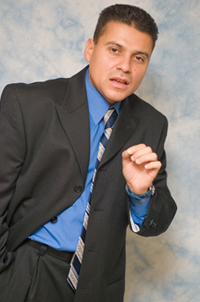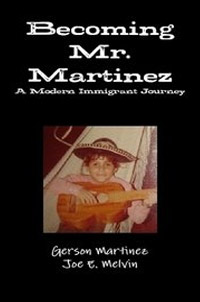This week’s featured author is Gerson Martinez. Mr. Martinez is a rising Latino speaker inspiring his audiences to grow personally, professionally, and socially. In addition, he is a poet and author. His book titled Becoming Mr. Martinez: A Modern Immigrant Journey, is enlightening and thought provoking – a must read!
Although Mr. Martinez currently resides in New Jersey, he is a keynote speaker at many universities and high schools around the country. Read our interview with Gerson Martinez and learn what inspired him to write his story and overcome some of the challenges in his life.


A little bit about me.
I was born in San Salvador amidst the civil war that lasted the whole decade of the 80s. But I moved to Canoga Park, California, about 20 minutes East of Los Angeles in 1982 at the age of seven. So, I went from a civil war in El Salvador to a racial clash in the Los Angeles area where gangs and internal racism affected/affects our community to this day. I reside in Trenton, New Jersey (The Capital) and I’ve been here for approximately 19 years. I attained my bachelor’s degree in Public Relations at Rider University. I left California due to the trouble relationship with my mother and the risk of becoming a statistic by my surroundings that included gangs, drugs, and violence.
You have a career as a powerful motivational speaker; however, you are also known as an accomplished word artist (poet) and novelist. Did your career provide you the spark to become a poet and author or was this always a passion of yours?
They are all intertwined. I was first a word artist (poet) performing at colleges and universities in the early part of the century. Due to the popularity of the art with Russell Simmons “Def Poetry Jam,” I joined an entertainment group called “BlackInQ” and toured the country. My civic work as an organizer of college conferences and mentoring programs in the inner cities along with state wide events that included the first ever “Latino Bike and Bus Tour” in the state of New Jersey, got me noticed as a civic leader. From there I was asked to speak in front of selected college leaders at the North East United States Hispanic Leadership Institute Conference in 2006. Speaking wasn’t something I sought but it fell naturally to me since I had performed poetry for college students before. Three years later at a conference in Newark, New Jersey, a Copy Editor for the Wall Street Journal was in the audience and heard me speak. He urged me to write a book about my life experiences as an immigrant so people could see that there are success stories outside of the extremes such as “the drug dealer that turns good,” or “the poor child that finds sports or entertainment to get out of the ghetto.” So, my life became the novel, Becoming Mr. Martinez: A Modern Immigrant Journey.
Do you prefer writing poetry or novels, or both? Please elaborate.
They are both therapeutic to me. Poetry is such an expressive art where grammar is not as important. I can take a pause or end a thought anywhere. I can take a scene and make it my own. Whether it is a love poem or one about civic issues, it is my expression, my thoughts, my perception of what I find good and bad in the world.
Novels are different then poems. In a poem you can get your point across right away, make an impact and you are done. With a novel you have to keep the reader enthralled from beginning to end and you also have to be grammatically correct and be in depth with the characters. You have to give a background of the characters and scene so people can feel like they are part of the story. If you can reach the person reading the book, it is because they feel like anyone of the characters can be him or her. If you can’t make it feel real, then you lost that reader.
What technical writing challenges do you find when writing poetry?
In a sense, I am not a regular poet so that I write and follow a structure such as Haikus, Ballads, or ABC, etc. My poems do rhyme at times, others tell a story. I really just like to express and write thoughts in a manner that I can understand myself. Seems selfish, but when you grow up in a revolutionary household like I did and have been rejected by love, you create your own sense of security with your words. Like Jazz musicians, I take poetry and create as I go. There are no boundaries as to what one can create. For example, a flower can describe the sensibility of a woman or the softness of her skin in a love poem. A protagonist of revolution can be “un Campensino” or “a child” without books or food in a social poem. Poetry for me is an outlet to scream at the world – to let you know how I feel and how I process the injustices of society or the beauty or downfall of romance.
What technical writing challenges did you come across as you wrote your novel?
Well, the book was difficult to write for so many reasons. One, because it is a story of immigrants that are not prepared for the social construct of the United States and you have to encapsulate everyone you can think of.
For example, the child that is just brought here from comfortable surroundings, the mother who had to bring her child, the mother working two or three jobs that loses touch with her family, the mother or father who is overwhelmed with the pressures of raising children in a society different from theirs, the life struggle of racial divide one is not prepared for when residing in a country of only one people and going to a country where there are many different races and cultures, the mentor who is not of the same racial background as the mentee, the teacher who doesn’t understand why her help is not enough, the poverty that one leaves in their country and the poverty one faces in the United States.
Making sure all these stories were told within the story was difficult. Because the main character has his story and those around him also have a story, it was a challenge to ensure that a connection was established between the main character and the secondary characters and yet bring them all together at the end. Questions I asked myself as I wrote my novel were: Why are these characters even friends? Why do these people hate each other if they are Latinos? Or why do they run towards violence in the streets? All is connected and at times even though you are telling the story of one person, you are really telling the story of millions.
What were some of the obstacles to publishing your literary works?
Someone to believe in your product! It’s sad because when you are writing the book you say to yourself, “wow, this is happening, this will be great for people to read and learn, laugh, cry and create critical thinking.” But when you send it to publishers and you don’t get a response, you begin to doubt your work. Finding the right person to believe or the right editor is arduous. I think that is why self publishing has become so prolific in this day. Publishers receive thousands of books, and who knows how many actually get read. I was fortunate that the person who wanted to write the book with me was from the Wall Street Journal.
If you were writing a book about your life, what would that title be?
The novel is based on my life story. But I wouldn’t have titled it “Becoming Mr. Martinez…” But since I wasn’t the one publishing it, I had no choice. But looking at it now, I think it does make sense, because although I feel old when people call me Mr. Martinez, it is about a kid whose life was a journey away from his home land and is an immigrant. And after completing the project, people who have read the book connect with me even more because it is a story that many of us go through but rarely gets told.
If you could have dinner with anyone in the world (dead or alive), who would it be and why?
My Uncle Moses – My uncle was assassinated in 1980 during El Salvador’s civil war. He was a union leader whose life was threatened and then eventually taken from him due to his involvement in the union movement. Growing up, I heard of Martin Luther King, Jr., Cesar Chavez, etc. and I grew up looking up to these men because of their conviction to the power of humility and service. But when I was old enough to understand why my uncle was murdered by the military government in El Salvador, I realized that I had a Martin Luther King Jr., Pedro Albizu Campos, Julian Jose Marti, Dolores Huerta etc. in my own family. What would I ask? What gave you the strength to do what you felt was right when your life was at risk? Hmmm… He’s one of my heroes.
Do you have any favorite authors or people that have influenced your writing?
Federico Garcia Lorca, Gabriel Garcia Marquez, Pablo Neruda, Jose Marti, Gil Scott Heron, Ana Maria Matute as well as song writers Bob Marley and Roger Waters.
What advice do you have for aspiring writers?
Yes, don’t give up! Knock on every door and keep writing. It is important to believe in one self and make others believe in you. But until you believe in yourself first, no one is going to believe in you. It’s like that old saying, “love yourself so you can be loved.” Trust me, the road is long and bleek, but when you see that little bit of light, run towards it! Because there is hope.
Can you tell us about any upcoming projects in the near future?
I am currently working on a book of love poems titled, “El Amor Por Ti.” Funny, because majority of the poems are in English, but the translation of the title doesn’t have the same impact. With God’s willing grace, I should be done by the middle of 2012. I’m also working on a short feature film. Don’t know when these projects will be completed as I’m in negotiation with some independent studios, but when I find out, I will let everyone know.
I am writing another book to be called, “Our Civic Compliance to US.” In this book, I will be discussing the importance of self preservation in our culture and the lack of unity. Education, health, economics, housing, and economic development will the focus. There is a lot to be done, yet we as a culture (Latino) cannot seem to work together. We will see if we can shine some light on our issues and move forward to prepare our young people to give of themselves.
Visit me at: www.gersonmartinez.com & www.lulu.com




